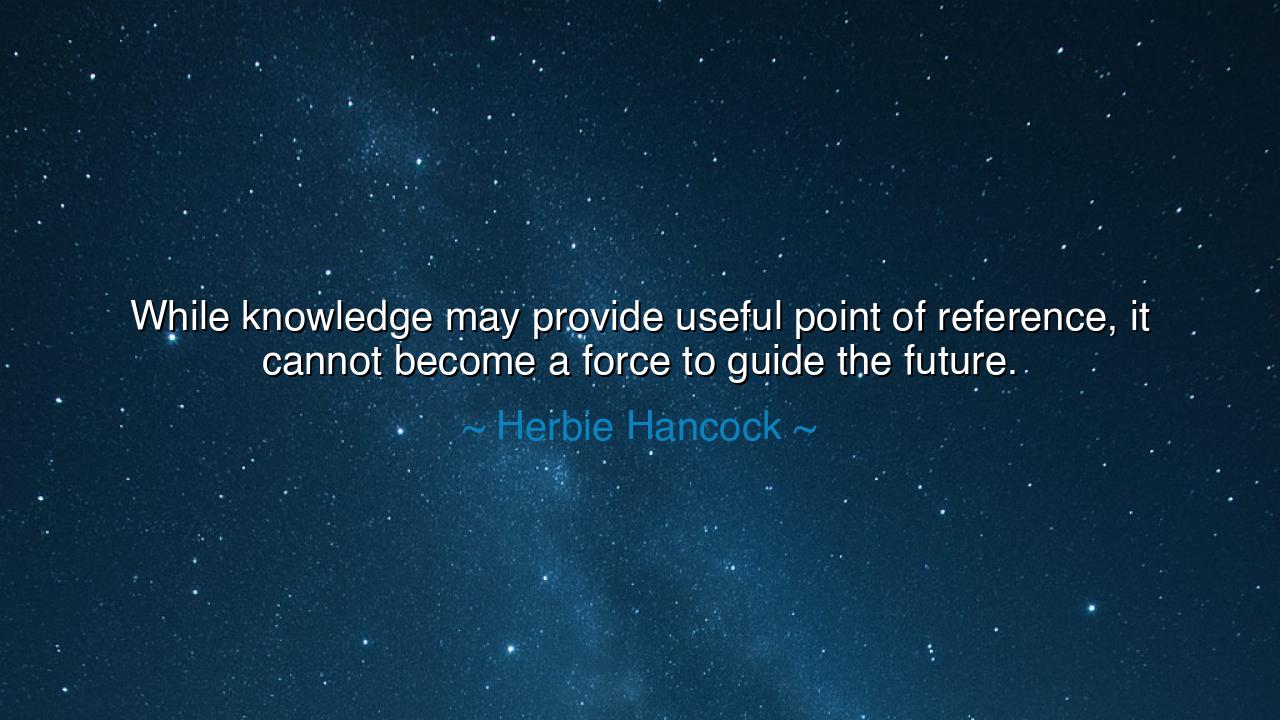
While knowledge may provide useful point of reference, it cannot
While knowledge may provide useful point of reference, it cannot become a force to guide the future.






The master musician and philosopher of rhythm, Herbie Hancock, once spoke a truth that resounds far beyond the realm of music: “While knowledge may provide useful point of reference, it cannot become a force to guide the future.” These words, born from a life steeped in both art and reflection, carry the weight of experience and the light of wisdom. Hancock reminds us that knowledge, though powerful, is not destiny. It is a tool, not a compass—a memory of what has been, not a prophecy of what will be. The future, he tells us, is not shaped by what we know, but by what we dare to imagine.
To understand the meaning of this saying, one must understand the man who spoke it. Herbie Hancock, one of the great innovators of jazz, lived his life in constant transformation. From his early years as a pianist under Miles Davis to his later forays into electronic music, he refused to be bound by the patterns of the past. Jazz, the art of improvisation, became his teacher—and through it he learned that to create, one must not rely solely on what is known, but must listen to the unknown. His words are the echo of that truth: that knowledge is a point of reference, but creation—the living spark of the future—comes from courage, intuition, and spirit.
In this, Hancock speaks the same wisdom the ancients knew. The philosophers of old taught that knowledge without imagination is like a ship without wind—anchored, unmoving. The future is not the repetition of yesterday’s facts, but the unfolding of new possibility. The wise man learns from the past but does not worship it; he honors experience but listens for what has never yet been heard. Thus, Hancock’s words are not a rejection of knowledge, but a call to transcend it—to let knowledge serve as a foundation, not a prison.
Consider the story of the Wright brothers, those quiet dreamers of Dayton who looked upon the science of their age and dared to see beyond it. The learned men of their time declared flight impossible; the knowledge of physics and engineering then known could not explain how a heavier-than-air machine could rise. Yet the brothers, unbound by the limits of accepted wisdom, built and flew the first airplane. Their knowledge gave them reference—the laws of motion, the designs of gliders—but it was vision, not information, that guided them into the sky. This is the heart of Hancock’s teaching: that the future belongs not to those who know, but to those who imagine beyond what is known.
There is a danger, Hancock warns, in mistaking knowledge for wisdom. Knowledge looks backward; it records, measures, categorizes. But wisdom looks forward; it listens to the rhythm of change and moves with it. To let knowledge “guide the future” is to walk backward into the unknown, carrying the weight of yesterday. In art, in science, in life, progress demands that we lift our eyes from the ledger of facts and gaze into the horizon of wonder. The artist who paints by formula ceases to create; the leader who governs by precedent ceases to inspire. The same truth lives in all of us: that to move ahead, we must first release what we cling to most tightly—the comfort of certainty.
Hancock’s insight arises from his own journey of artistic evolution. When jazz purists condemned his fusion of acoustic and electronic sound, he pressed on, knowing that the future of music required faith, not nostalgia. His album Head Hunters, which blended funk, jazz, and technology, became a landmark precisely because he refused to be guided by knowledge alone. “You have to step into the unknown,” he once said, “if you want to find something new.” That is the eternal law of creation and of life itself: the future is not built by those who rely on maps, but by those who make new ones.
O seeker of truth, hear this lesson well: knowledge is a lamp, not the path itself. Let it light your way, but do not mistake its glow for the horizon. Use what you know, but do not let it bind your imagination. When the mind grows too proud of its learning, it loses its ability to wonder; when it becomes too cautious, it forgets how to dream. The world moves forward only when someone dares to look beyond what has been proven—to feel, to create, to risk.
Therefore, let your knowledge serve your vision, not restrain it. Learn deeply, but live boldly. Let the wisdom of the past inform you, but let the spirit of curiosity lead you. The future is a field yet unplanted, and the seeds that grow there are sown not by memory, but by imagination. As Hancock’s words remind us, the truest guide to tomorrow is not what we have already learned—but what we have not yet dared to dream.






AAdministratorAdministrator
Welcome, honored guests. Please leave a comment, we will respond soon